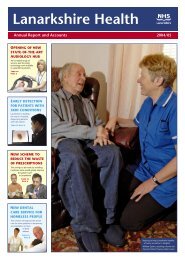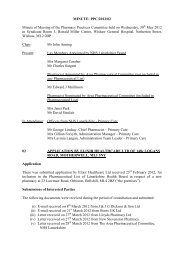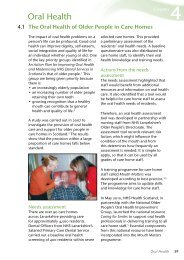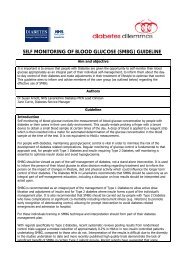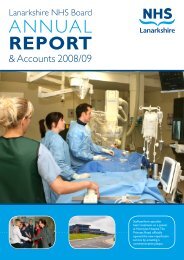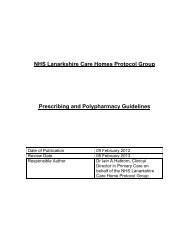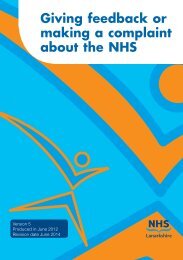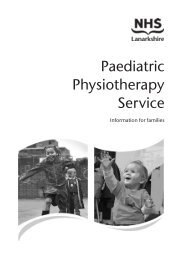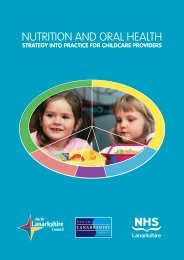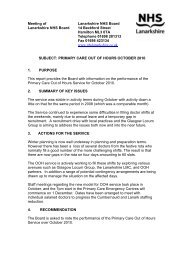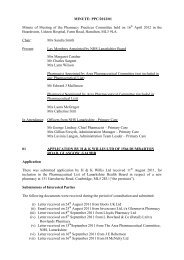Management of In-patients with Loose Stools ... - NHS Lanarkshire
Management of In-patients with Loose Stools ... - NHS Lanarkshire
Management of In-patients with Loose Stools ... - NHS Lanarkshire
You also want an ePaper? Increase the reach of your titles
YUMPU automatically turns print PDFs into web optimized ePapers that Google loves.
Note: Completion<br />
<strong>of</strong> Review<br />
<strong>NHS</strong> <strong>Lanarkshire</strong><br />
Health Protection Committee<br />
Section E1<br />
Effective From Sep 2010<br />
Replaces Jun 2010<br />
Pages 7 <strong>of</strong> 31<br />
SECTION E 1 - <strong>Management</strong> <strong>of</strong> <strong>In</strong>-<strong>patients</strong> <strong>with</strong><br />
<strong>Loose</strong> <strong>Stools</strong>: Gastrointestinal Outbreak<br />
Review Date March 2013<br />
Health Protection Committee approved review date extension to March 2013<br />
If visible blood is present, disinfect as per guidelines <strong>with</strong>in Section I, Control <strong>of</strong> <strong>In</strong>fection<br />
Manual<br />
Clean and rinse <strong>of</strong>f disinfectant <strong>with</strong> warm water<br />
Dispose <strong>of</strong> paper towels, gloves and aprons into the clinical waste bag<br />
SIGNIFICANT EXPOSURE/CONTAMINATION TO VOMIT/FAECES<br />
Any member <strong>of</strong> staff who has had a significant exposure to faecal matter, either by the<br />
definition below or by having their clothing grossly contaminated, must fill out a DATIX form.<br />
A significant exposure/contamination to blood/body fluid is defined as a contact <strong>of</strong> broken skin,<br />
mucous membrane or eyes <strong>with</strong> another person’s blood or body fluid.<br />
2. GASTROINTESTINAL OUTBREAK<br />
BACKGROUND<br />
Gastrointestinal symptoms can be caused by numerous factors. Outbreaks <strong>with</strong>in healthcare<br />
settings are generally caused by viral pathogens most commonly Norovirus, however they can<br />
be caused by bacterial infections. Outbreaks <strong>of</strong> viral disease, in particular Norovirus are more<br />
common during the winter months, they have a short incubation period and usually cause<br />
vomiting and/or diarrhoea. Other clinical features consist <strong>of</strong> abdominal pain and a low-grade<br />
fever. A viral gastrointestinal illness is highly transmissible and is usually passed from person<br />
to person <strong>of</strong>ten by vomit/faecal contamination and is the main cause <strong>of</strong> outbreaks <strong>with</strong>in<br />
healthcare settings.<br />
RECOGNITION OF AN OUTBREAK<br />
Early evidence <strong>of</strong> outbreaks <strong>of</strong> infection may be detected by nursing/medical staff, the<br />
<strong>In</strong>fection Control Team or by the Microbiology Laboratory<br />
It is recognised that there cannot be absolute criteria for defining an outbreak or problem<br />
and in certain circumstances staff may have to act on the grounds <strong>of</strong> 'reasonable suspicion'.<br />
Staff should act promptly and seek advice where there is concern rather than worry about<br />
'false alarms'. It is much better to be cautious, and to report early, rather than to wait until a<br />
major problem is evident<br />
ANY OF THE FOLLOWING IS SUGGESTIVE OF A PROBLEM:<br />
Any patient <strong>with</strong> a confirmed laboratory report <strong>of</strong> a gastrointestinal pathogen such as<br />
salmonella<br />
Unexplained diarrhoea in two or more <strong>patients</strong> <strong>with</strong>in the same 24hr period<br />
Unexplained vomiting in two or more <strong>patients</strong> <strong>with</strong>in the same 24hr period<br />
E 7



